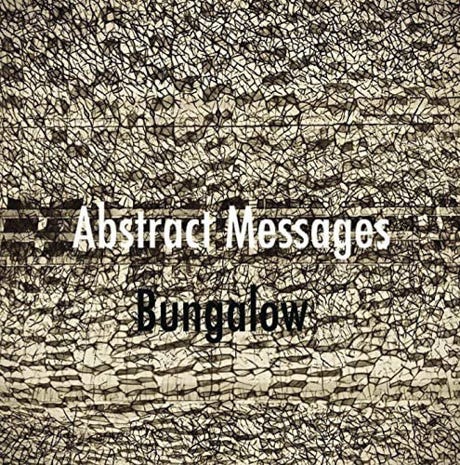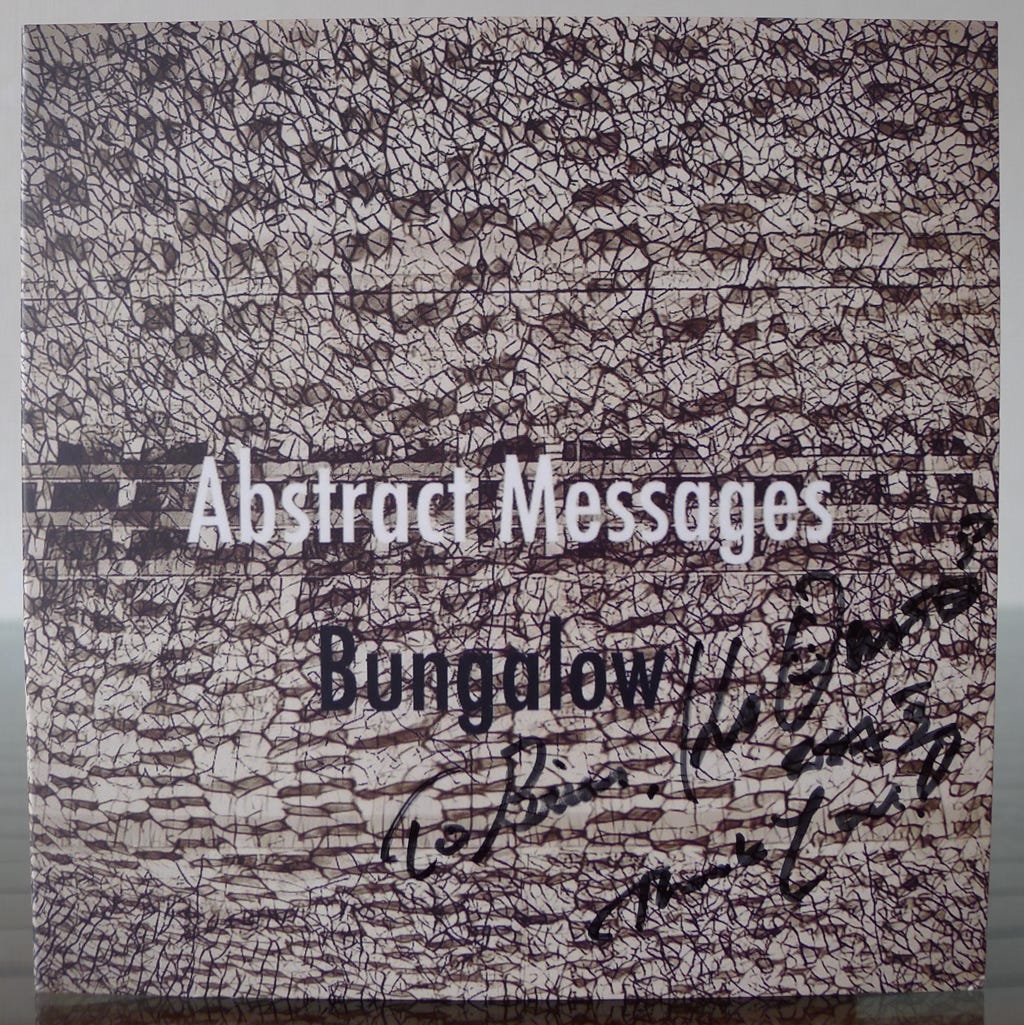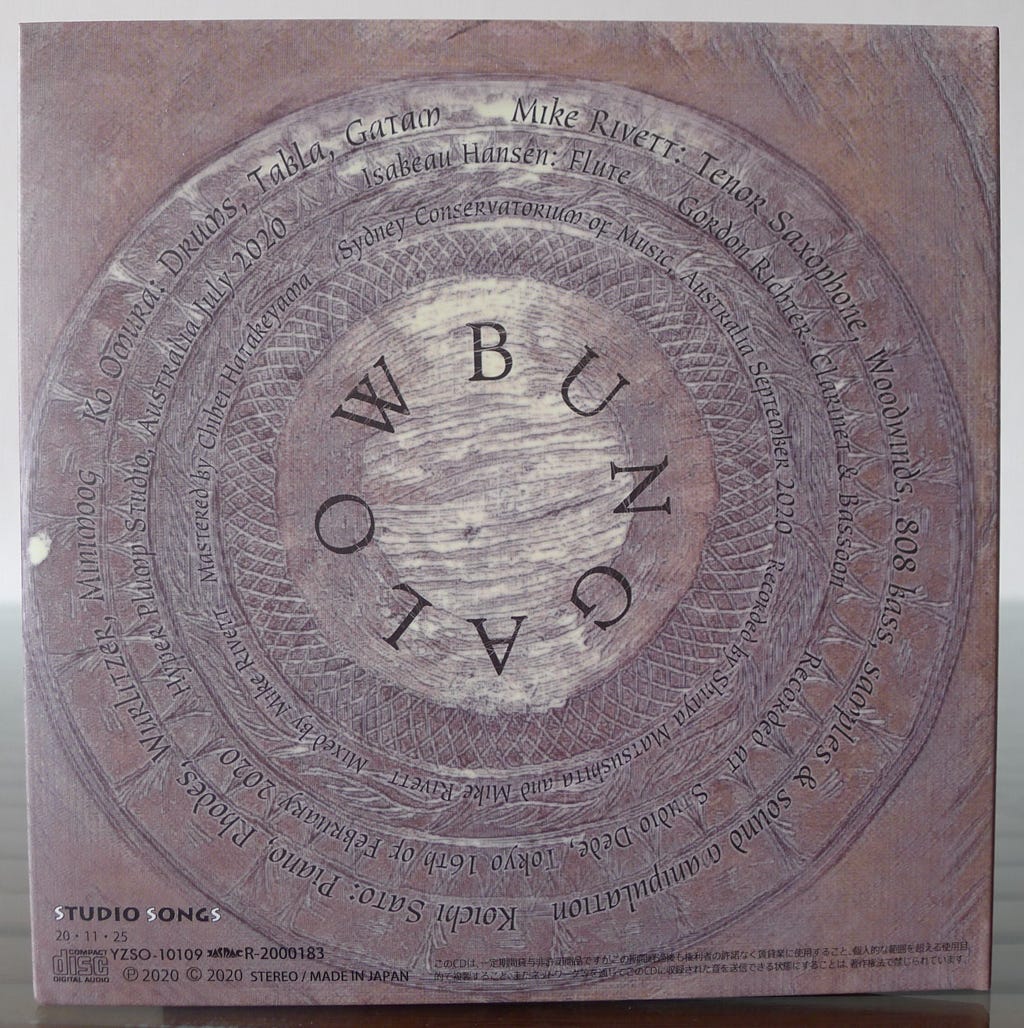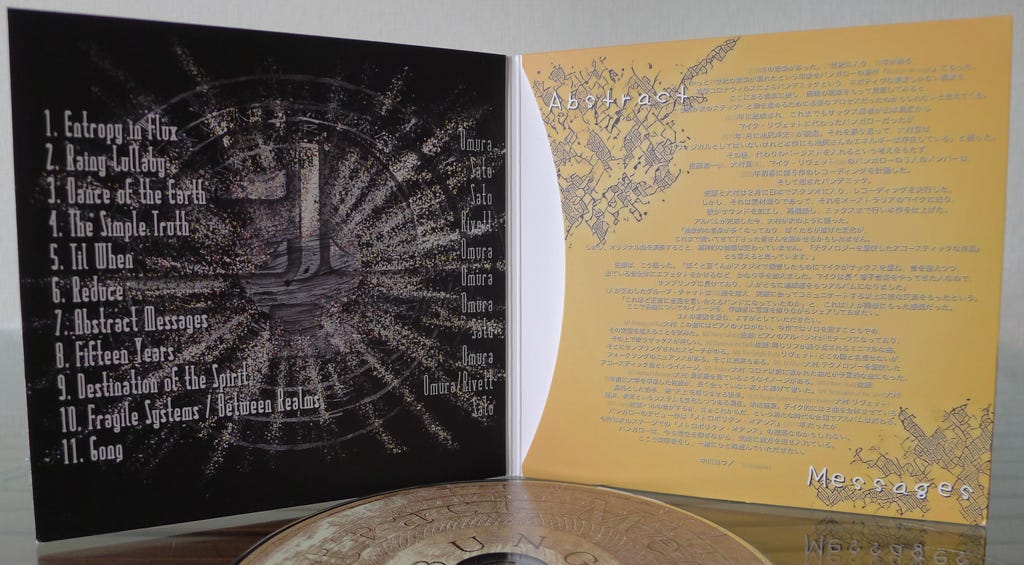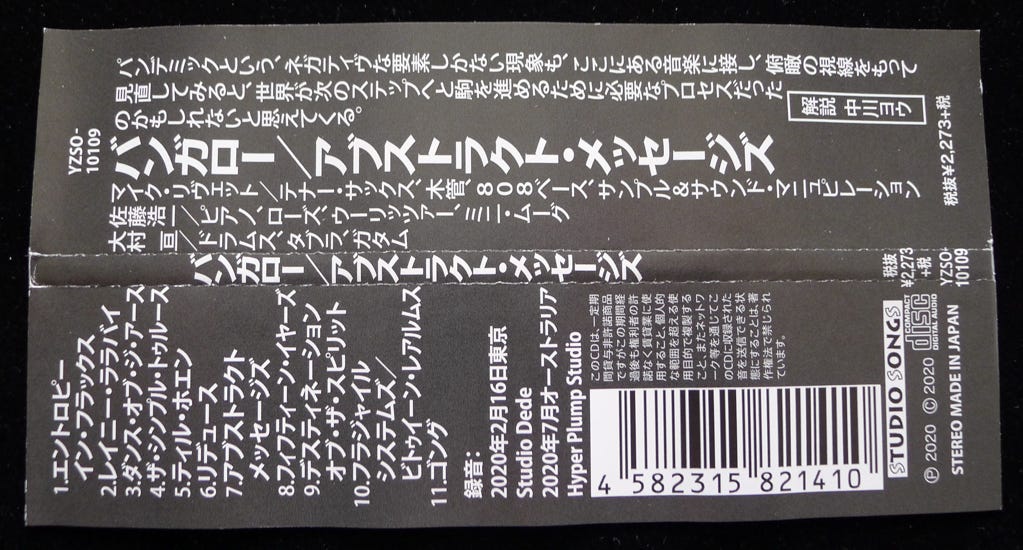Bungalow: Abstract Messages
Abstract Messages is the final record from the group Bungalow, an album created under unique circumstances and with a different structure from previous releases. A mix of acoustic instruments and electronic sounds, the album is not only full of beautiful music but is also an accomplishment of coordination, both in its creation and the dynamic of the music.
Confined to two separate countries in 2020, the three remaining members of Bungalow were recorded in two different sessions. The two musicians Koichi Sato and Ko Omura recorded piano and percussion in Japan and handed off the recordings to third member Mike Rivett in Australia, who layered in saxophones, loops, and sound effects, and finished the mixing.
The result is wondrous, an interweaving of shorter sketches of sound and longer two-part musical stories. The songs seek to surpass conventions like trading of solos and patterns, and often set up foundations of cycling riffs and odd-metered percussion beats, all with a sense of acoustic humanness threaded with synthetic interjections of trilling chirps and buzzes, whispers of ambient sound, and blankets of samples and recorded speech.
With eleven tracks averaging three to seven minutes each, the album itself even seems to contain a subtle “A” and “B” side. The first six tracks are shorter three-to-four-minute sketches, continuously coalescing into moments of solid music and dissolving into cloud-like mists. This music is full of twists of arpeggios and streams of piano and sax melodies in combination with fascinating percussion and drum sounds, interlaced with the sinew and muscle of electronic filters, modulation, and samples moving together through flex and relaxation.
The next set of five tracks contains songs averaging six minutes each, several of which even contain a two-part structure. For example, “Abstract Messages”, “Destination of the Spirit”, and “Fragile Systems/Between Realms” each roughly plays out in two parts, establishing contrasts of serenity and chaos, pairs of organic and synthetic, or raw and digital forces that mirror the acoustic and electronic balance at play throughout the album. The final track, “Gong”, takes this concept furthest, switching back and forth several times between busy and ambient soundscape interludes with a restlessly manic musical loop.
Absorbing and hypnotic, this final album from Bungalow (or “Post Bungalow”, as named in one of their final videos) is a worthy end statement, weighty with experimental and melodic emotional output, radial waves tying up the frayed edges of modern obstacles and challenges into a new, beautiful mosaic.
Liner Notes
(Translated from the original Japanese liner notes written by Yo Nakagawa.)
There was music from the year 2020. Twenty years into the twenty-first century, Bungalow's new album Abstract Messages brought about the impression that twenty-first-century music had appeared at last.
The new coronavirus brought about a pandemic and nothing but negativity, but encountering this music and reflecting with a birds-eye view, perhaps this was a necessary process for the world to advance to the next step.
Bungalow was formed in 2010 with saxophonist Masahiro Yamamoto who was later replaced by Mike Rivett. In January 2019 bassist Hiroshi Ikejiri withdrew from the band. Reflecting back, Ko Omura says that although he's not physically present on the recording, Ikejiri's energy is also captured in the work.
After that, without any thought of including a replacement bassist, a three-member Bungalow with Koichi Sato (piano), Ko Omura (drums), and Mike Rivett (Sax) made a plan for a fifth Bungalow recording in the early spring of 2020.
Then the pandemic happened.
Sato and Omura entered the studio in Japan in February and went ahead with the recording. However, these recorded ingredients were sent to Mike in Australia, who processed the sound, reconstructed it, and mixed it to finish the recording.
Now with the album complete, Omura said, “There's a lot of abstract music, and the change we've arrived at may surprise a lot of people who have listened to us so far. However, in the performance of original music, the spiritual feeling has not changed. I think that it can be said that it's an acoustic work that makes full use of technology.”
Sato said, “To the music Ko and I recorded in the studio, Mike layered in sax and arranged the sound. He made quite a number of adjustments such as adding effects to the overall sound produced. Mike has long been a person involved with electronic music and sampling. It's an album on which the three of us feel a sense of accomplishment together.”
The messages the three exchanged in group chats exceeded 100 and seemed to foster a closer exchange than when actually meeting and communicating in person.
“Have we become such a band that can exchange opinions so frankly?” This was a feeling shared by the three members.
Here I would like to share the impressions of each song borrowing the words of the song's composer as a way of understanding each song and hinting at the intentions of the three musicians.
M1. Entropy in Flux (Omura) - There is no piano solo in this song. We stopped exchanging solos on this album and tried to go beyond that template.
M2. Rainy Lullaby (Sato) - A piano arpeggio establishes the motif, with saxophone singing beautifully over it.
M3. Dance of the Earth (Sato) - A minimalist song with the same riff repeated, overlaid with a sampled speech.
M4. The Simple Truth (Rivett) - Without naming a particular country, there is the nuance of a folk song. There is also truth there.
M5. Til When (Omura) - An impression of acoustic music making full use of technology.
M6. Reduce (Omura) - A song written before corona, but one that became a prophetic song.
M7. Abstract Messages (Omura) - An impression of looking at a mandala.
M8. Fifteen Years (Sato) - Sato graduated from university fifteen years ago and wrote this song for a friend he hadn't seen for a long time.
M9. Destination of the Spirit (Omura) - A chaotic first half, with "nothingness" and "heaven" experienced in the second half.
M10. Fragile Systems/Between Realms (Omura/Rivett) - The system of economy and education also continues to change in the present. The vicissitudes of fortune. Take-wise, two songs are combined.
M11. Gong (Sato) - Hearing the sound of a bell… Well, at this point, the album ends with this sign of a new era.
Bungalow's debut album was Metropolitan Oasis (2011), and the present work may be a proposal for the next stage of Metropolitan Oasis.
Even now, Bungalow beckons you in, inviting you to relax while looking up at the blue sky.
Now, let's take a deep breath, and hang out for a while together.
中川ヨウ/ Yo Nakagawa
Abstract Messages by Bungalow
Mike Rivett - tenor sax, woodwinds, 808 bass, samples & sound manipulation
Koichi Sato - piano, Rhodes, Wurlitzer, Minimoog
Ko Omura - drums, tabla, gatam
Isabeau Hansen - flute
Gordon Richter - clarinet & bassoon
Released in 2020 on Studio Songs as YZSO-10109.
Japanese names: Koichi Sato 佐藤浩一 Ko Omura 大村亘
Related Albums
Bungalow: Metropolitan Oasis (2011)
Bungalow: Past Life (2013)
Bungalow: Unseen Scenes (2015)
Bungalow: You Already Know (2017)
Audio and Video
Video for “Abstract Messages” (excerpt), track #7 on this album
Excerpt from “Fifteen Years”, track #8 on this album:


